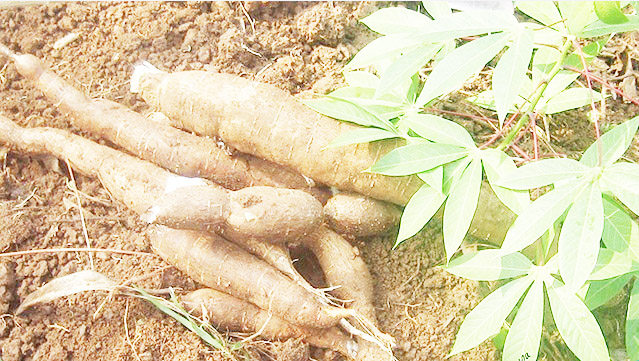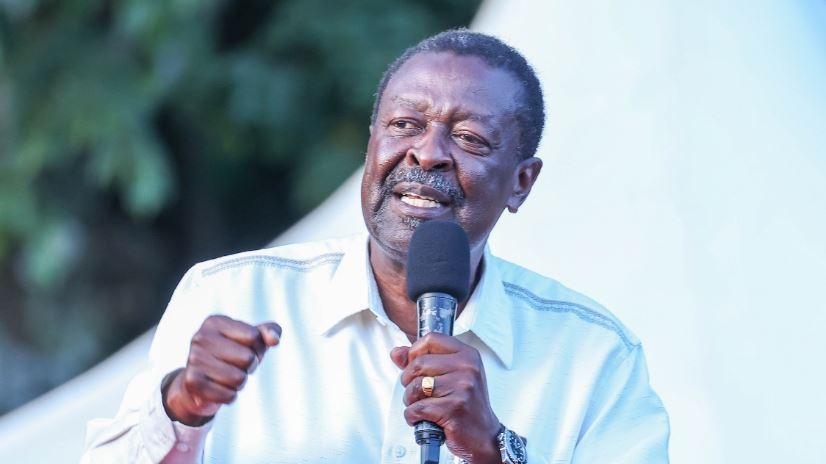

MH96 cassava /FILE
A quiet revolution is taking root in the fertile lands of
Busia, where MH96 cassava, an improved variety developed by the Kenya
Agricultural and Livestock Research Organization in Alupe, is reshaping the
agricultural landscape.
The cassava variety is quickly becoming a favourite among farmers and processors. It is a variety known for its drought resilience.
Specifically, the genotype MH96/0686 has demonstrated lower stomatal conductance and improved resistance to drought compared to other varieties like Nyalanda. This makes MH96 a valuable option for cultivation in areas with limited water availability.
A visit to Martha Aroni, a well-known cassava farmer at Apetite village in Teso South, one is welcomed by a green canopy of MH96 cassava variety in her farm which according to her is the best compared to local variety which longer to mature.
"This cassava variety is the best and it has no side effects on human beings so it can be used for value addition to make different consumables," Aroni said.
The improved GMO takes between six and 12 months and allows for intercropping. Once uprooted, another plant can be planted at the same place and does well, improving the soil texture besides eliminating diseases.
Aroni further said the variety is environmental friendly and free from pest and diseases attack. The variety flourishes even in less fertile land thus reducing the demand for organic fertiliser.
"The improved variety is highly resistant to diseases, which is a significant relief for farmers who often struggle with pest and disease outbreaks that threaten cassava yields," she said.
The high productivity of MH96 is another compelling reason why farmers are attracted to and are embracing it. Compared to the local cassava varieties, MH96 yields more per acre, ensuring better returns for farmers.
According to Aroni, the variety matures early, allowing farmers to harvest in a shorter period, which is crucial in ensuring food security and continuous supply to the market.
Beyond its food benefits, MH96 cassava leaves have medicinal properties. The medicinal uses of the leaves provide an opportunity for farmers to diversify their income streams, as they can be used in herbal remedies and traditional medicine.
Some 12kms from Apetite village, we meet another farmer Margret Otote, from Agorom village who has been cultivating MH96 cassava and shared her experience, expressing satisfaction with the variety.
“MH96 is the best variety I have ever planted. It has no side effects on humans, and it can be used for value addition to make different products,” Otote said.
The versatility of MH96 allows it to be processed into flour, animal feed and other value-added products, making it an economic powerhouse for farmers looking to maximise profits.
She further added that with all these advantages, MH96 is poised to transform cassava farming in Kenya. The improved variety ensures food security, boosts income for farmers and provides safer and more nutritious food options for consumers. As more farmers embrace MH96, the future of cassava farming in the country looks brighter than ever.
Michael Onyango, a processor, said GMO cassava has been a game changer. It is more resistant to pests and diseases, which means they receive higher-quality roots with less spoilage.
"That directly improves our efficiency and output, whether we are making flour, starch, or ethanol, the higher starch content in MH96 GMO varieties, in particular, helps reduce processing time and cost," he said.
He added that some customers still have questions about the safety and long-term effects of GMOs, but from a production standpoint, GMO cassava has improved their yield consistency, which is crucial for planning and scaling operations.
Teresia Achola, a nutritionist in Busia county said MH96 GMO cassava has the potential to address nutritional deficiencies, especially when it's bio-fortified with nutrients like vitamin A. This is critical in regions where cassava is a staple food and malnutrition is common like Busia.
The modified varieties still provide the same calorie value and fiber but can now offer additional nutrients.
"Current studies show that GMO cassava approved for consumption is safe. The key is regulatory oversight to ensure proper testing. As long as it is enriched responsibly, the health benefits outweigh the concerns especially when fighting vitamin, A deficiency and food insecurity."
According to a local food vendor, GMO cassava helps them get better-quality roots with fewer pests and spoilage, that means more reliable supplies for making products like cassava chips and crisp. It lasts longer in storage too, which cuts down on waste and saves money.
"Some are curious or a bit skeptical, but most care more about taste, price and hygiene. As long as the food tastes good and is safe, they are happy. If it also helps farmers grow more and keeps our prices stable, that is a win for everyone."















![[PHOTOS] Family, friends receive body of Raila’s sister, Beryl](/_next/image?url=https%3A%2F%2Fcdn.radioafrica.digital%2Fimage%2F2025%2F11%2Fdfe6a9bf-ede1-47a4-bdc0-4f564edb03dd.jpeg&w=3840&q=100)

